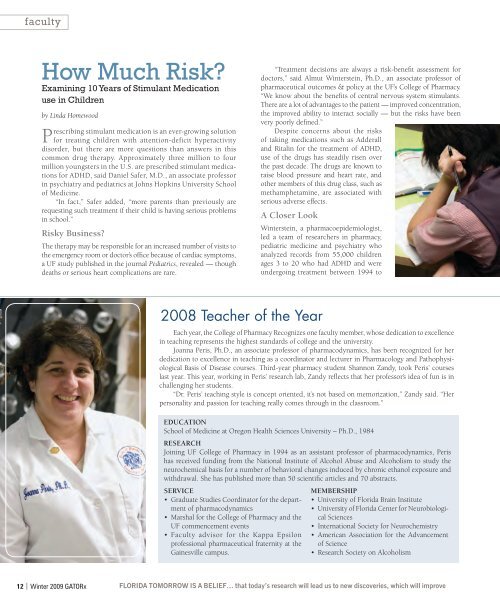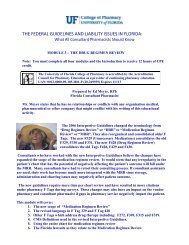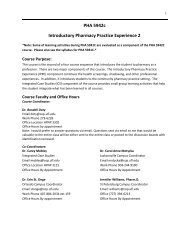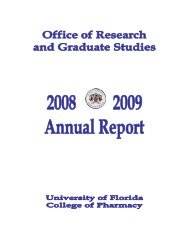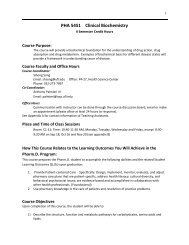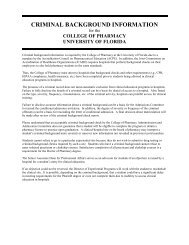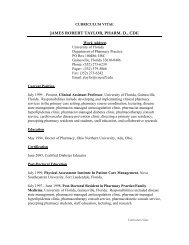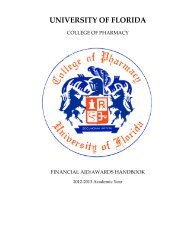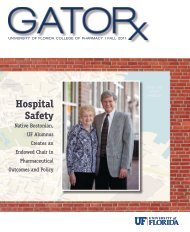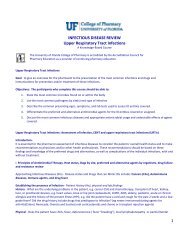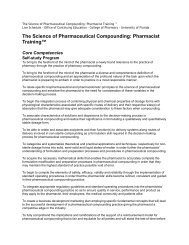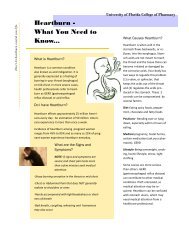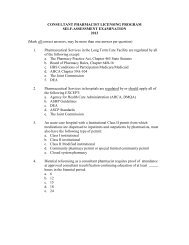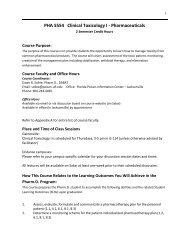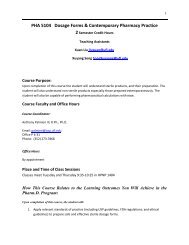Depths - College of Pharmacy - University of Florida
Depths - College of Pharmacy - University of Florida
Depths - College of Pharmacy - University of Florida
Create successful ePaper yourself
Turn your PDF publications into a flip-book with our unique Google optimized e-Paper software.
faculty<br />
How Much Risk?<br />
Examining 10 Years <strong>of</strong> Stimulant Medication<br />
use in Children<br />
by Linda Homewood<br />
Prescribing stimulant medication is an ever-growing solution<br />
for treating children with attention-deficit hyperactivity<br />
disorder, but there are more questions than answers in this<br />
common drug therapy. Approximately three million to four<br />
million youngsters in the U.S. are prescribed stimulant medications<br />
for ADHD, said Daniel Safer, M.D., an associate pr<strong>of</strong>essor<br />
in psychiatry and pediatrics at Johns Hopkins <strong>University</strong> School<br />
<strong>of</strong> Medicine.<br />
“In fact,” Safer added, “more parents than previously are<br />
requesting such treatment if their child is having serious problems<br />
in school.”<br />
Risky Business?<br />
The therapy may be responsible for an increased number <strong>of</strong> visits to<br />
the emergency room or doctor’s <strong>of</strong>fice because <strong>of</strong> cardiac symptoms,<br />
a UF study published in the journal Pediatrics, revealed — though<br />
deaths or serious heart complications are rare.<br />
12 | Winter 2009 GATORx<br />
2008 Teacher <strong>of</strong> the Year<br />
“Treatment decisions are always a risk-benefit assessment for<br />
doctors,” said Almut Winterstein, Ph.D., an associate pr<strong>of</strong>essor <strong>of</strong><br />
pharmaceutical outcomes & policy at the UF’s <strong>College</strong> <strong>of</strong> <strong>Pharmacy</strong>.<br />
“We know about the benefits <strong>of</strong> central nervous system stimulants.<br />
There are a lot <strong>of</strong> advantages to the patient — improved concentration,<br />
the improved ability to interact socially — but the risks have been<br />
very poorly defined.”<br />
Despite concerns about the risks<br />
<strong>of</strong> taking medications such as Adderall<br />
and Ritalin for the treatment <strong>of</strong> ADHD,<br />
use <strong>of</strong> the drugs has steadily risen over<br />
the past decade. The drugs are known to<br />
raise blood pressure and heart rate, and<br />
other members <strong>of</strong> this drug class, such as<br />
methamphetamine, are associated with<br />
serious adverse effects.<br />
A Closer Look<br />
Winterstein, a pharmacoepidemiologist,<br />
led a team <strong>of</strong> researchers in pharmacy,<br />
pediatric medicine and psychiatry who<br />
analyzed records from 55,000 children<br />
ages 3 to 20 who had ADHD and were<br />
undergoing treatment between 1994 to<br />
Each year, the <strong>College</strong> <strong>of</strong> <strong>Pharmacy</strong> Recognizes one faculty member, whose dedication to excellence<br />
in teaching represents the highest standards <strong>of</strong> college and the university.<br />
Joanna Peris, Ph.D., an associate pr<strong>of</strong>essor <strong>of</strong> pharmacodynamics, has been recognized for her<br />
dedication to excellence in teaching as a coordinator and lecturer in Pharmacology and Pathophysiological<br />
Basis <strong>of</strong> Disease courses. Third-year pharmacy student Shannon Zandy, took Peris’ courses<br />
last year. This year, working in Peris’ research lab, Zandy reflects that her pr<strong>of</strong>essor’s idea <strong>of</strong> fun is in<br />
challenging her students.<br />
“Dr. Peris’ teaching style is concept oriented, it’s not based on memorization,” Zandy said. “Her<br />
personality and passion for teaching really comes through in the classroom.”<br />
edUCAtion<br />
School <strong>of</strong> Medicine at Oregon Health Sciences <strong>University</strong> – Ph.D., 1984<br />
ReSeARCH<br />
Joining UF <strong>College</strong> <strong>of</strong> <strong>Pharmacy</strong> in 1994 as an assistant pr<strong>of</strong>essor <strong>of</strong> pharmacodynamics, Peris<br />
has received funding from the National Institute <strong>of</strong> Alcohol Abuse and Alcoholism to study the<br />
neurochemical basis for a number <strong>of</strong> behavioral changes induced by chronic ethanol exposure and<br />
withdrawal. She has published more than 50 scientific articles and 70 abstracts.<br />
SeRviCe<br />
MeMBeRSHiP<br />
• Graduate Studies Coordinator for the depart- • <strong>University</strong> <strong>of</strong> <strong>Florida</strong> Brain Institute<br />
ment <strong>of</strong> pharmacodynamics<br />
• <strong>University</strong> <strong>of</strong> <strong>Florida</strong> Center for Neurobiologi-<br />
• Marshal for the <strong>College</strong> <strong>of</strong> <strong>Pharmacy</strong> and the cal Sciences<br />
UF commencement events<br />
• International Society for Neurochemistry<br />
• Faculty advisor for the Kappa Epsilon • American Association for the Advancement<br />
pr<strong>of</strong>essional pharmaceutical fraternity at the <strong>of</strong> Science<br />
Gainesville campus.<br />
• Research Society on Alcoholism<br />
<strong>Florida</strong> Tomorrow is a BelieF… that today’s research will lead us to new discoveries, which will improve


